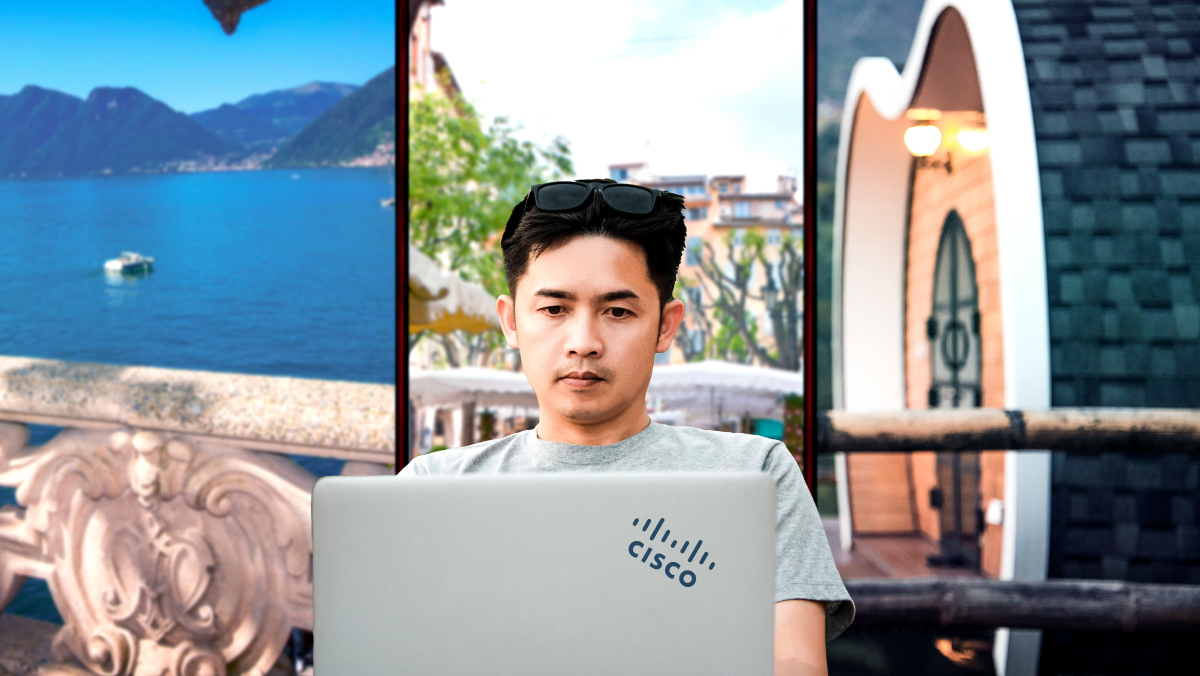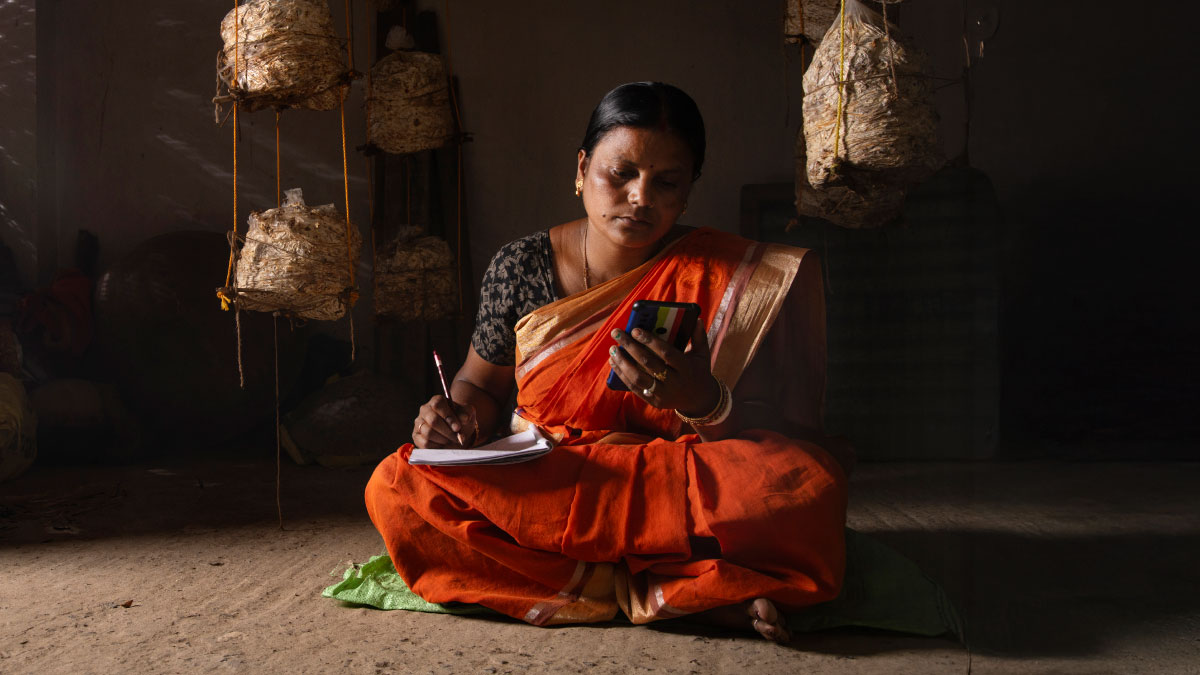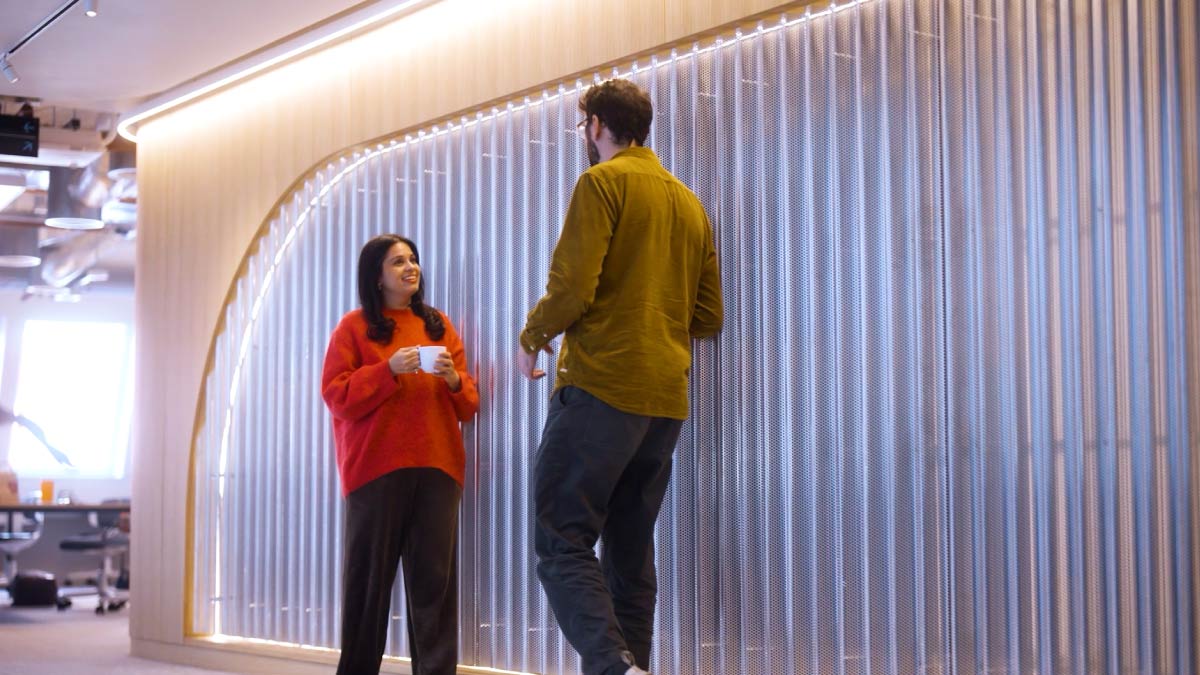In the hybrid-work era, people can connect from just about anywhere. So, why not a Greek island with dramatic, rocky coastlines and stunning, turquoise seas?
For three months, 17 Cisco workers from all corners of Europe have been doing just that. As part of a program called Digital Nomads, they have experienced the deep, ancient history, rich local culture, and breathtaking natural beauty of Rhodes — all while doing their own jobs and contributing to the community.
“It’s not like being a tourist,” said Federica Tommasi, Cisco’s employee and executive communications manager for Southern Europe, who is normally based in Milan. “I walk home from my office along the sea, and through the universe called the city of Rhodes. We’re surrounded by nature, but we also get to mix with the local people, who are very kind and open. And really learn about the culture.”
Beyond culture, cuisine, and beaches, however, lies a serious purpose. The program, dubbed “Cisco Island” by participants, stems from a partnership between Cisco and the local Rhodes government. As with a similar initiative in Venice last year, the goal is to demonstrate the vast potential of hybrid work — and its ability to spur local economies and draw top talent beyond major cities.
These 17 Cisco workers view themselves as the advance guard in a new paradigm of work — one in which talented digital nomads are enriched with new experiences while contributing to local economies around the world in myriad ways.
“There’s a powerful saying, ‘beauty connects people,’” said Agostino Santoni, vice president of Cisco South Europe, and a key driver of the program. “I believe it’s true in this case. It’s the beauty of the nature, the beauty of the light. But it’s also how the island connects our people with the people, workers, and government on Rhodes. We are creating something there that is unique.”
‘The most beautiful region in the world’
As part of their time in Rhodes, the Cisco workers are contributing to the digitization and transformation of Rhodes. An economy that relies heavily on tourism, Rhodes sees the Digital Nomads program as an opportunity to expand the island’s appeal.
George Chatzimarkos, governor of Greece’s South Aegean Islands region, oversees 50 inhabited islands. And in his unbiased opinion considers it “the most beautiful region in the world.” Chatzimarkos has partnered with Cisco on digitization and sustainability projects, as well as an innovation hub on Syros to explore better maritime technologies. And he’s excited about the prospect of digital nomads coming to his region, especially in the slower tourism months.
“I am very much in favor of the digital nomads,” he said. “The islands of my region have a seasonality. For months, November to April, the islands are quiet. But this is the time when people from northern countries might want to escape their winters. This could be a drive to open up the economy in those months,”
With longer-term stays, digital nomads can also contribute their dynamism, talent, and economic energy. All of which is in keeping with Cisco’s core purpose: powering an inclusive future for all.
“With this new concept of hybrid work,” said Santoni, “you can think differently about your experience as a person or a worker, where you want to live, and where you want to contribute. It’s quite compelling. And it fits very well with our view of the world and our purpose at Cisco.”
To support the program — while encouraging future digital nomads to visit the island — Cisco provided the technology for world-class hybrid work experiences, while supporting other initiatives, such as telemedicine for local hospitals.
The technology included collaboration hardware and software in Cisco workers’ apartments and in several workspaces spread across government offices and local museums.
“Everybody has a Cisco DeskPro in their apartment,” said Sven Joseph, a Cisco technical program manager based in Belgium, “and they are also in the offices. The idea is to provide all the technology one needs wherever they choose to work.”
At the same time, important insights are being collected. For example, the impact of different work habits on electricity usage is being studied. And Cisco is partnering with a company called Ambisense to measure indoor and outdoor air quality and integrate the data with Webex for real-time prompts and to explore how these may affect hybrid work habits. (For all its pristine, natural beauty, the city of Rhodes still suffers from smog under certain conditions).
“You can get environmental measurements, straight from your Webex device,” Joseph explained. “So, with a touch of a button, you can assess the air quality, the temperature, the humidity, and so on. And Webex can prompt you, for instance, to open a window if the inside air is stale.”
A commitment to community
Each Cisco employee is also involved in volunteer activities, designed to support the local community. These range from planting trees and sharing food with poorer families to teaching tech skills and helping parentless kids learn safe internet practices.
“Most people who come to Rhodes as tourists do not spend the time to really learn about the island itself,” said Silvia Fortunato, a Cisco virtual sales account manager from Italy. “This is a way to help the economic situation on the island, and really learn about the people and culture.”
Fortunato, who hails from Southern Italy but traveled north to Milan for greater opportunities, sees the Digital Nomad program as a chance to demonstrate the potential global impact of hybrid work.
“So many of us have moved to big cities because there is a chance to work there,” she said.
“But it’s very sad because many people would like to stay where they were born, and they cannot for economic reasons. That’s why this program is so amazing. I hope we can replicate it around the world.”
To that end, the Cisco Digital Nomad program plans to extend its experience in Venice last year and Rhodes today to include locations like South Africa or Selma, Alabama, both of which are under consideration for 2024.
For Chatzimarkos, Cisco's Digital Nomads program is demonstrating nothing less than a new way of life, in which simplicity, community, and nature are seamlessly integrated with productive, creative work — and doing it in places like Rhodes, where, he stresses, “you don’t need to be wealthy to have a great quality of life.”
“The ancient Greeks talked about having balance and harmony in everything you do,” Chatzimarkos concluded. “This is a very important message for all of us around the world. I believe this digital nomad movement is going to be huge in the next years. And we want to show the world that our islands are places not only for vacation, but places to work, develop, create, and live.”





